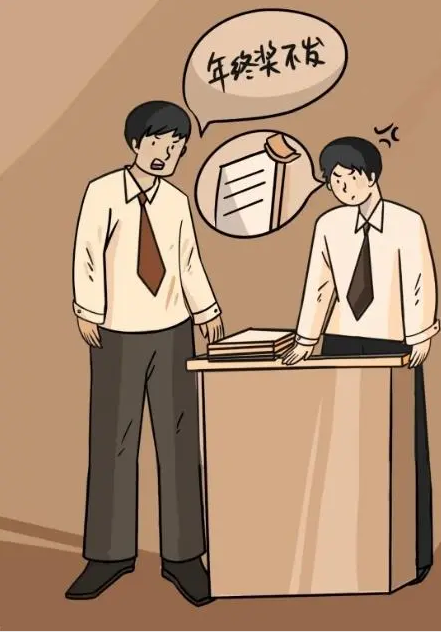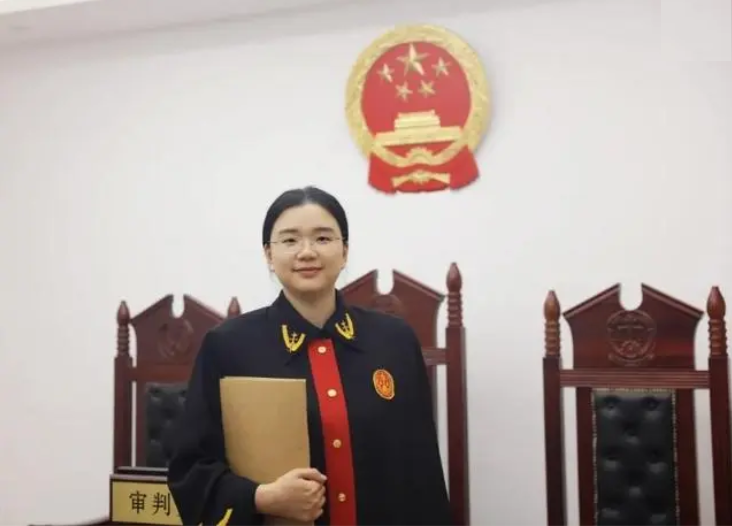- Source: The Supreme People's Court
- Author: Unknown Author
- Time: 2024-05-11
- Visits: 1092
A single drop of water can reflect the radiance of the sun.
A single case can reveal the principles of the rule of law.
A single case can reveal the principles of the rule of law.
The official WeChat account of the Supreme People's Court has launched the column "Small Cases, Great Principles; New Trends of the Times", taking you to review those shining "small cases", savor the "principles" contained in them, and jointly feel the positive energy of fairness and justice promoted in every judicial case. In this issue, we present a dispute case regarding the year-end bonus.
The year-end bonus represents the employer's recognition of the employee's work performance over the past year, and it is generally distributed to employees at the end of the current year or at the beginning of the following year. Is the power to distribute the year-end bonus in the hands of the employer? When the employer refuses to distribute the year-end bonus, how can employees protect their legitimate rights and interests? Recently, the Beijing court concluded a dispute case regarding the year-end bonus. A certain company was judged to have lost the lawsuit because it failed to provide evidence on the method of distributing the year-end bonus and the reasons for not distributing it.

Basic Case Facts
Mr. Gao joined a company in Beijing in March 2015 as a resident factory staff member, with a monthly salary standard of 30,000 yuan. The labor contract signed by both parties stipulated: "Whether the year-end bonus is issued shall be independently determined by the company according to factors such as the overall business situation and the individual work performance of employees." The company in Beijing distributes the year-end bonus for the previous year around March every year. Mr. Gao successively received the year-end bonuses from 2016 to 2020 for five consecutive years.
In 2022, the company in Beijing informed Mr. Gao that the year-end bonus for 2021 would no longer be issued on the grounds that "the distribution of the year-end bonus falls within the company's independent business operation rights and the company is facing operational difficulties". After a dispute arose between the two parties, they sued to the court. During the litigation, the company in Beijing did not provide any evidence regarding the calculation of the year-end bonus or the company's business situation.
The first-instance trial of the People's Court of Haidian District, Beijing held that, first of all, the company in Beijing had issued year-end bonuses to Mr. Gao for five consecutive years. As an employer with management responsibilities, the company in Beijing should bear the burden of proof regarding the specific issuance conditions, issuance standards and calculation methods of the year-end bonus. However, the company in Beijing did not submit evidence in this regard and should bear the adverse consequences. Furthermore, the company in Beijing claimed that it did not need to pay the year-end bonus on the grounds of operational difficulties, but did not submit evidence regarding the claimed operating losses and should bear the legal consequences of failing to provide evidence. Finally, the court, referring to the amount of the year-end bonus issued in 2020, ordered the company in Beijing to pay Mr. Gao a year-end bonus of 25,000 yuan for 2021.
After the judgment of this case was pronounced, the company in Beijing was dissatisfied and filed an appeal. The second-instance judgment rejected the appeal and upheld the original judgment. Currently, the judgment has taken legal effect.
Thoughts of the Judge

Judge Wang Fang, People's Court of Haidian District, Beijing
The year-end bonus is a reward paid by the employer to the employee and is an integral part of labor compensation. Paragraph 1, Article 30 of the Labor Contract Law of the People's Republic of China stipulates: "The employer shall timely and fully pay labor compensation to the employee in accordance with the labor contract agreement and national regulations." Current laws and regulations do not mandatorily stipulate whether the employer should set up a year-end bonus, how to set it up, etc. If there is an agreement between the employer and the employee on the distribution standard or conditions of the year-end bonus, such an agreement shall prevail; if there is no agreement or the agreement is unclear, it shall be comprehensively evaluated whether the year-end bonus should be distributed according to the rules and regulations formulated through the democratic process within the employer, the past distribution practices, and whether the relevant elements of the distribution conditions are met.
In judicial practice, if some employers refuse to issue year-end bonuses on the grounds of business difficulties of the enterprise or the employee's unqualified annual assessment, they shall bear the corresponding burden of proof for their own claims. If no evidence is submitted, they shall bear the legal consequences of failing to provide evidence on their own.
In order to avoid labor disputes arising from the distribution of year-end bonuses and to build a harmonious and stable labor relationship, employers should standardize their employment management, clearly agree with employees on the distribution conditions, distribution standards, etc. of the year-end bonus in the labor contract, or make detailed provisions on the distribution rules of the year-end bonus in the form of rules and regulations, standardize the distribution of the year-end bonus, and consciously safeguard the legitimate rights and interests of employees. At the same time, employees should also perform their duties in a standardized manner, actively complete their work tasks, abide by professional ethics and rules and regulations, pay attention to retaining relevant evidence, and safeguard their legitimate rights and interests in accordance with the law.
Expert Comment
Professor, Doctoral Supervisor of the Law School of Central University of Finance and Economics, Vice President of the Professional Committee on Labor and Personnel Dispute Settlement of the China Labor Association

Shen Jianfeng
The year-end bonus is an incentive mechanism by which employers distribute bonuses based on the annual business performance and the work achievements of employees. It can take into account the overall business situation of the enterprise and also provide long-term incentives for employees, which is widely adopted in current employment management practices. Due to the long-term nature of the year-end bonus itself, as well as the unclear reward rules of some employers regarding the year-end bonus or various adjustments during the employment process, disputes related to it occur relatively frequently. For employers, improving the year-end bonus rules, reasonably setting the reward conditions, assessment procedures, and reward rules under special circumstances, etc., is of positive significance for giving full play to the incentive function of the year-end bonus and preventing labor disputes. A common problem in practice is that employers have unclear reward conditions or procedures for the year-end bonus, or there are no rules regarding the year-end bonus at all. In such cases, if it is considered that there are no rules to follow, employers will have full freedom to control the year-end bonus. On the one hand, this is not conducive to protecting employees' reasonable expectations, and on the other hand, it will instead encourage employers to avoid setting up year-end bonus rules in a roundabout way. Therefore, in this case, based on the fact that the employer has issued year-end bonuses for consecutive years, the judge correctly allocated the burden of proof through the application of evidence rules. When the two parties had an agreement on the conditions for issuing the year-end bonus, and the employer failed to provide any evidence for the reasons of not issuing the year-end bonus, the judge supported the employee's claim for the year-end bonus, and the corresponding judgment result is reasonable.
This case also involves a more fundamental issue: to what extent the employment management practices of employers are binding on the future and can serve as the basis for employees' claims. The labor relationship is a continuous legal relationship with strong elements of trust and cooperation, and the expectations and trust of the parties are the foundation for the sound operation of this legal relationship. Therefore, the employment management practices of employers hold a very special position in the coordination of labor relations and the determination of the rights and obligations of the parties. Based on the employer's past practice of repeatedly paying year-end bonuses, and by analyzing the agreed content of the year-end bonus, in the case where the employer fails to provide evidence to prove its claim, the judgment idea of supporting the employee's claim for the year-end bonus not only protects the rights and interests of employees in a specific case and balances the interests of employees and employers, but also has enlightening significance for the judgment of similar cases.
Source: News Bureau of the Supreme People's Court, Higher People's Court of Beijing Municipality, People's Court of Haidian District, Beijing Municipality
Author: Wei Han | Cartoonist: Lü Shaowen

孙大炮 Publication Time: 2024-05-11Reply
×
这种情况,最好是把年终奖写到劳动合同里面,这样就没有问题了。